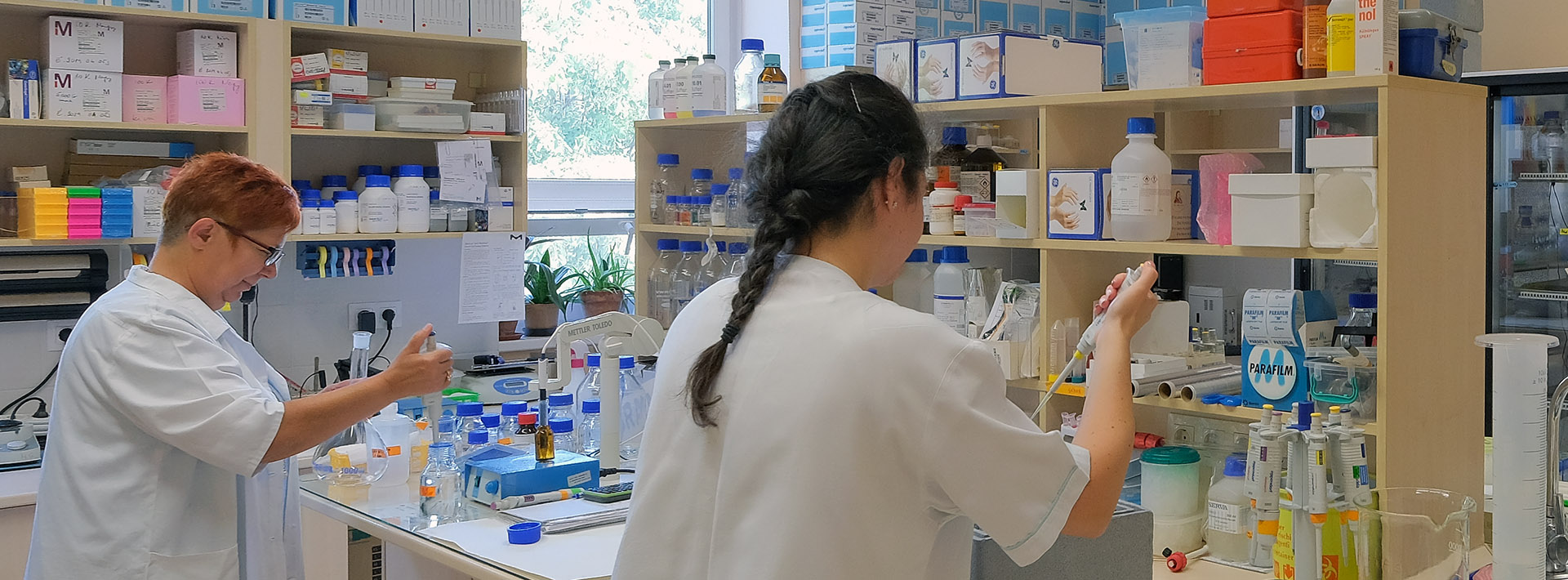Data
Official data in SubjectManager for the following academic year: 2022-2023
Course director
-
Dr. László GRAMA
associate professor,
Department of Biophysics -
Number of hours/semester
lectures: 14 hours
practices: 0 hours
seminars: 28 hours
total of: 42 hours
Subject data
- Code of subject: OBA-103-T
- 2 kredit
- Biotechnology MSc
- Basic modul
- autumn
-
Course headcount limitations
min. 1 – max. 200
Topic
Teaching the basics of math skills and techniques used in the laboratory work as well as statistical methods.
Lectures
- 1. Introduction. Math basics: powers, exponents, logarithms - Dr. Grama László
- 2. Physical quantities and units. Conversion of units - Dr. Grama László
- 3. Concentrations - Dr. Grama László
- 4. Dilutions - Dr. Grama László
- 5. Spectrophotometry, radioactive decay, bimolecular interactions, centrifugation - Dr. Grama László
- 6. Lab maths summary, test writing - Dr. Grama László
- 7. Descriptive statistics 1: measures of the center and the spread of the data - Dr. Bugyi Beáta
- 8. Descriptive statistics 2: data representation, box-whisker plots, histograms - Dr. Bugyi Beáta
- 9. Normal distribution, hypothesis testing - Dr. Bugyi Beáta
- 10. Hypothesis testing: Z test, t test - Dr. Bugyi Beáta
- 11. Hypothesis testing: ANOVA - Dr. Bugyi Beáta
- 12. Hypothesis testing: KHI2 test - Dr. Bugyi Beáta
- 13. Test writing, Correlation, regression 1 - Dr. Bugyi Beáta
- 14. Correlation, regresion 2 - Dr. Bugyi Beáta
Practices
Seminars
- 1. Introduction. Math basics: powers, exponents, logarithms
- 2. Introduction. Math basics: powers, exponents, logarithms
- 3. Physical quantities and units. Conversion of units
- 4. Physical quantities and units. Conversion of units
- 5. Concentrations
- 6. Concentrations
- 7. Dilutions
- 8. Dilutions
- 9. Spectrophotometry, radioactive decay, bimolecular interactions, centrifugation
- 10. Spectrophotometry, radioactive decay, bimolecular interactions, centrifugation
- 11. Lab maths summary, test writing
- 12. Lab maths summary, test writing
- 13. Descriptive statistics 1: measures of the center and the spread of the data
- 14. Descriptive statistics 1: measures of the center and the spread of the data
- 15. Descriptive statistics 2: data representation, box-whisker plots, histograms
- 16. Descriptive statistics 2: data representation, box-whisker plots, histograms
- 17. Normal distribution, hypothesis testing
- 18. Normal distribution, hypothesis testing
- 19. Hypothesis testing: Z test, t test
- 20. Hypothesis testing: Z test, t test
- 21. Hypothesis testing: ANOVA
- 22. Hypothesis testing: ANOVA
- 23. Hypothesis testing: KHI2 test
- 24. Hypothesis testing: KHI2 test
- 25. Test writing, Correlation, regression 1
- 26. Test writing, Correlation, regression 1
- 27. Correlation, regresion 2
- 28. Correlation, regresion 2
Reading material
Obligatory literature
Literature developed by the Department
Will be published on Teams, Moodle or PotePedia.
Notes
Recommended literature
Conditions for acceptance of the semester
Maximum of 25 % absence allowed
Mid-term exams
Students will write 2 midterm tests from the 2 major sections of the material: lab maths and statistics. Two retake opportunities will be provided to those who do not pass these tests.
Making up for missed classes
None.
Exam topics/questions
Midterm tests and their retakes consist of problem solving and calculations from the main topics of the course.
Examiners
Instructor / tutor of practices and seminars
- Dr. Bugyi Beáta
- Dr. Grama László
